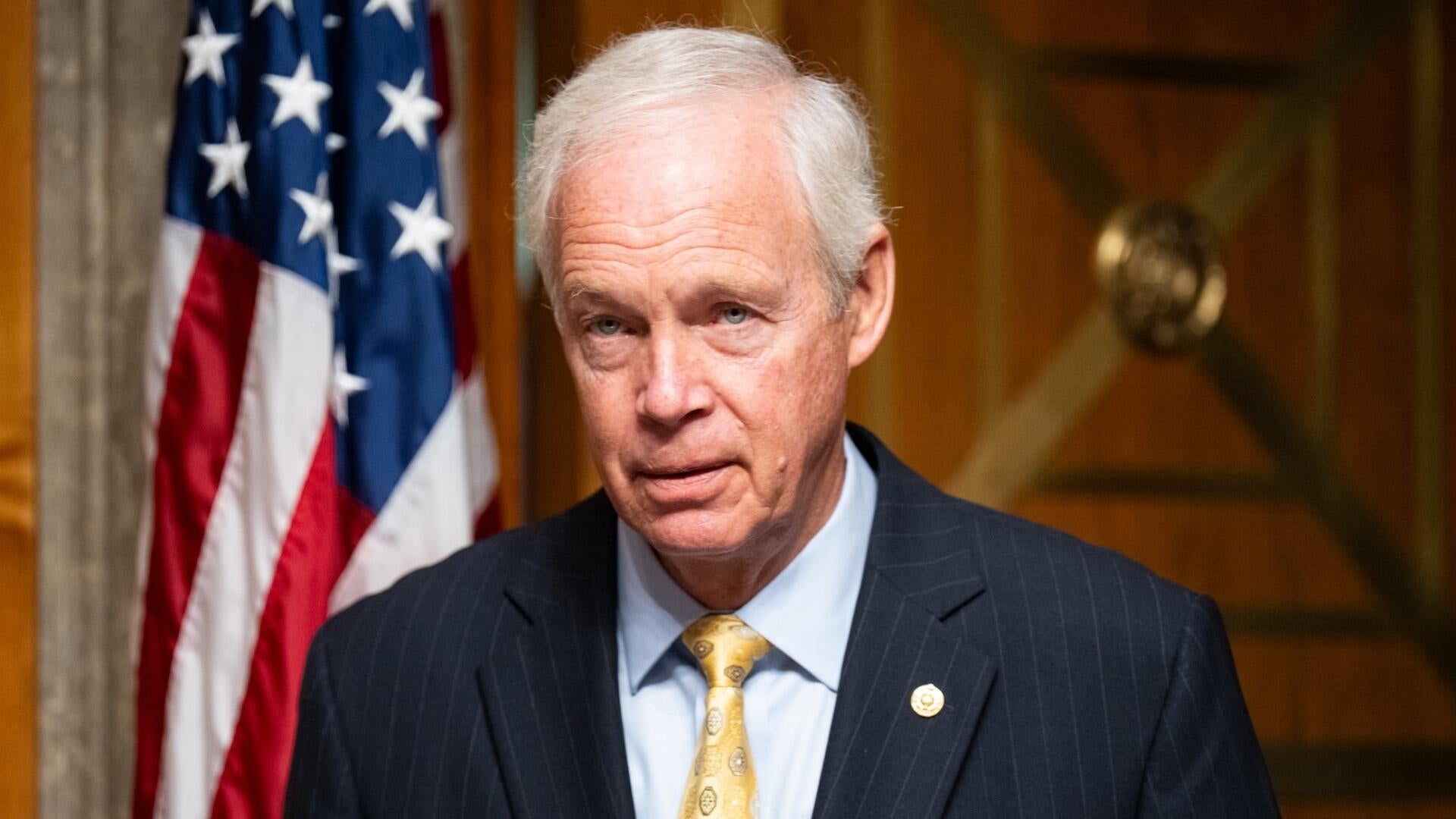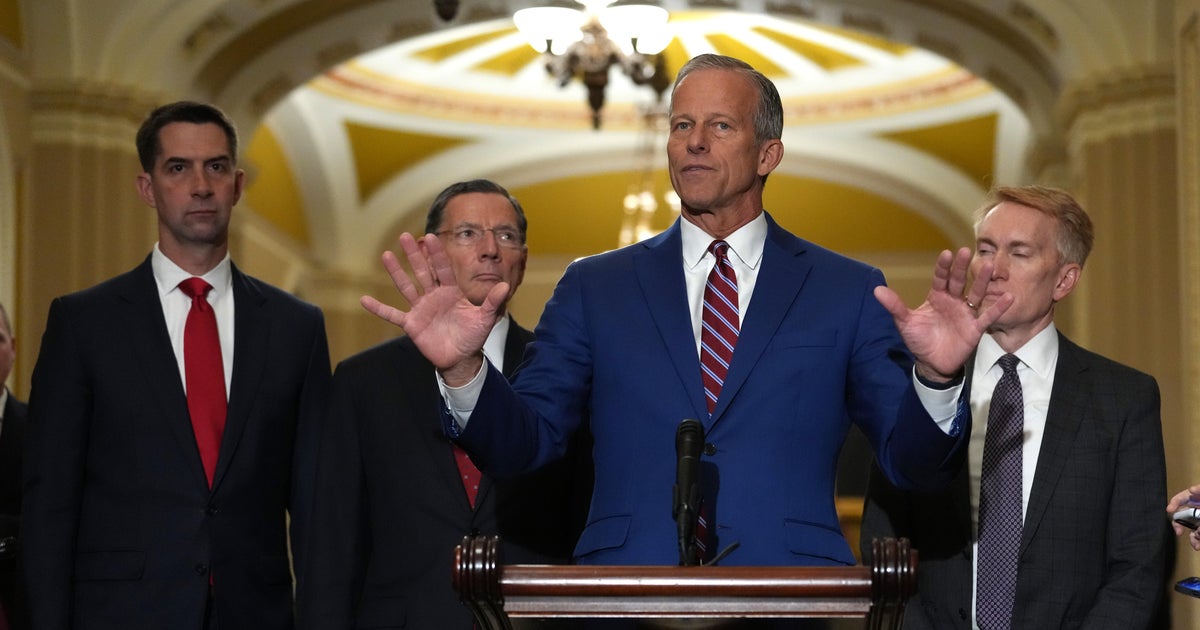What key GOP senators want to change in Trump's House-passed "one big beautiful bill"
Washington — The 365bet¹Ù·½ÍøÕ¾ is taking up the massive budget package containing President Trump's second-term agenda, a measure that squeaked through the House in May with a one-vote margin, solely with Republican votes. Its path through the 365bet¹Ù·½ÍøÕ¾ seems destined to be similarly narrow, with the package almost certain to be revised, since parts of it are opposed by a handful of GOP senators critical to its passage.
House Speaker Mike Johnson, a Louisiana Republican, recently ventured to the other side of the U.S. Capitol to remind Republican senators "that we are one team" and pleaded with them to keep the bill substantially intact.
"I encouraged them to make as few modifications as possible, remembering that I have a very delicate balance on our very diverse Republican caucus over in the House," Johnson said in an interview with "Face the Nation with Margaret Brennan" on May 25.
365bet¹Ù·½ÍøÕ¾ Majority Leader John Thune, a South Dakota Republican, has acknowledged that balance, but told reporters "the 365bet¹Ù·½ÍøÕ¾ will have its imprint" on the bill. He can afford three "no" votes from Republicans if all Democrats vote to block its passage in the 365bet¹Ù·½ÍøÕ¾, and there are no absences.
GOP Sen. Rand Paul of Kentucky has already indicated he opposes the bill because it will "explode the debt." Including interest, the House bill would increase the debt by $3.1 trillion, according to the Committee for a Responsible Federal Budget. Similar to the House, in the 365bet¹Ù·½ÍøÕ¾, there are Republicans who think there's not enough cost cutting, while others argue some provisions are too draconian.
These are the key sticking points as the legislation moves to the 365bet¹Ù·½ÍøÕ¾:
Medicaid changes
Sens. Susan Collins of Maine, Lisa Murkowski of Alaska and Josh Hawley of Missouri are among the Republicans who have expressed concern about some of the changes to Medicaid, a government program that provides health care to low-income Americans as well as those with disabilities. And the trio of senators supported an amendment to the budget resolution earlier this year that would have removed the language instructing the committee overseeing Medicaid to make $880 billion in cuts. That amendment failed.
The House-passed legislation includes new work requirements that would apply to childless Medicaid recipients without disabilities between the ages of 19 and 64. It also requires states to conduct more frequent eligibility checks on Medicaid recipients to root out waste, fraud and abuse, and it would penalize states that provide state-funded health care to undocumented immigrants. The bill also seeks to lower federal costs by freezing states' provider taxes at current rates and prohibiting them from establishing new provider taxes, among other changes.
While these 365bet¹Ù·½ÍøÕ¾ Republicans have generally been supportive of the work requirements, some have warned that they will not support the bill if it includes any cuts to Medicaid benefits.
In a New York Times published earlier in May, Hawley called "slashing health insurance for the working poor" both "morally wrong and politically suicidal."
A handful of senators have also warned of the impact of freezing provider taxes at current levels, since states use the taxes to help fund their share of Medicaid costs, although Murkowski has expressed support for this. Hawley said he's concerned about the impact on rural hospitals, while also voicing opposition to new copay requirements for beneficiaries.
"I'm concerned about the provider tax. That's not a direct benefit cut, but if it closes rural hospitals, then people can't get coverage," Hawley told reporters on June 2. "And I'm concerned about the cost sharing, I guess we're calling it — the sick tax. That's kind of a tax on benefit. You can't get your benefit in terms of seeing the doctor until you pay money out of pocket."
He added, "If rural hospitals close, what's the difference between that and a benefit cut? That's pretty tough."
Republican Sen. Jim Justice of West Virginia has also indicated that the provider tax could be an issue for him, telling reporters on June 3 that a "drastic" decrease "will really cut into the bone and really hurt a lot of folks." But Justice clarified he is OK with a freeze on the tax.
Deeper spending cuts
Meanwhile, a number of fiscal hawks have balked at the bill's spending cuts or even threatened to oppose the measure without securing deeper cuts, echoing the frustration expressed on the other side of the Capitol by members of the conservative House Freedom Caucus throughout negotiations on the package.
Sen. Ron Johnson, a Wisconsin Republican, said the package's aim to cut $1.5 trillion "isn't squat, quite honestly." And Sen. Rick Scott, a Florida Republican, has also rebuffed the cuts, saying the amount is "not going to do it."
"Their bill would not pass in the 365bet¹Ù·½ÍøÕ¾, and I think there's plenty of us that would vote against it," Scott told reporters in May, adding that the upper chamber should go through every line in the budget to find savings.
Sen. Roger Marshall, a Kansas Republican, "the job of the 365bet¹Ù·½ÍøÕ¾ is to try to increase the cuts in spending," calling the House cuts a "great start" while urging the 365bet¹Ù·½ÍøÕ¾ to hit $2 trillion. And Sen. Ted Cruz, a Texas Republican, the network that he believes "the 365bet¹Ù·½ÍøÕ¾ is going to cut spending more than the House."
"We're going to see the 365bet¹Ù·½ÍøÕ¾ be more fiscally conservative," Cruz added.
Sen. John Kennedy, a Louisiana Republican, agreed that the 365bet¹Ù·½ÍøÕ¾ needs to consider steeper cuts.
"I've said repeatedly I'm for cutting until we run out of votes," Kennedy said on June 2.
Rolling back IRA clean energy tax credits
The House-passed bill would also roll back some of the clean energy tax credits under the Biden-era climate and health care law, including an earlier phasing out of a tax break for clean energy vehicles. But the provisions could face opposition in the upper chamber.
In April, Murkowksi, along with GOP Sens. John Curtis of Utah, Jerry Moran of Kansas and Thom Tillis of North Carolina, penned a to the 365bet¹Ù·½ÍøÕ¾ majority leader to "emphasize the importance of maintaining a stable and predictable tax framework to promote domestic energy development."
"While we support fiscal responsibility and prudent efforts to streamline the tax code, we caution against the full-scale repeal of current credits, which could lead to significant disruptions for the American people and weaken our position as a global energy leader," the group wrote.
Tillis told reporters after the House passed the bill that the 365bet¹Ù·½ÍøÕ¾ needs to "look at the specifics" of revising the clean energy tax credits, saying "we've got to make sure the businesses who believe the government was setting this as a priority don't have a lot of stranded costs."
At the same time, other 365bet¹Ù·½ÍøÕ¾ Republicans, like Johnson, have called for eliminating the clean energy tax credits, setting up a possible clash within the conference.
State and local tax deduction
Among the provisions that spurred extensive debate in the House was one allowing residents to deduct more in state and local taxes on their federal returns, known as SALT. Divisions over an increase to the SALT cap threatened to sink the package in the days leading up to its passage in the lower chamber as a handful of blue-state Republicans fought for a higher cap, ultimately settling for $40,000, an increase from $10,000.
In the 365bet¹Ù·½ÍøÕ¾, the deduction is not an issue, since none of the blue states have Republican senators. Accordingly, a number of 365bet¹Ù·½ÍøÕ¾ Republicans have indicated that they oppose its inclusion in the bill.
"Eliminate it," Johnson, the Wisconsin senator, told reporters in May of the SALT cap increase.
Republican Sen. Kevin Cramer of North Dakota The Hill that the cap could potentially be cut in half once the 365bet¹Ù·½ÍøÕ¾ makes its changes.
But the House speaker said he warned senators that changing the provision would not only risk getting it through the lower chamber again, but also the Republican majority.
"In the House, we do have a number of members who are elected in places like New York and California and New Jersey, and they have to provide some relief to their constituents," the Louisiana Republican told "Face the Nation" in May. "Those are what we call our majority makers. Those are the people who are elected in the toughest districts and help us have the numbers to keep the majority in the House, and so, this is political reality."
Thune acknowledged the dynamic after a group of Republican senators met with the president on June 4, saying that "we will work with our House counterparts and with the White House to try and get that issue in a place where we can deliver the votes to get the bill across the finish line."
Republican Sen. Markwayne Mullin of Oklahoma vowed on June 2, "We're not going to touch SALT."
"I think that's a killer if we try to adjust that back down to [$30,000], or even back to [$10,000]," he said.
Debt ceiling
Fiscal hawks are also unhappy with the inclusion of a provision raising the debt ceiling by trillions of dollars. The House-passed bill includes a $4 trillion debt ceiling hike, while the 365bet¹Ù·½ÍøÕ¾'s budget blueprint contained a $5 trillion increase. The debate comes as Treasury Secretary Scott Bessent told congressional leaders earlier this month that the federal government could be unable to pay its bills as soon as August if Congress doesn't act.
Paul has been the most vocal in opposing an increase to the debt limit. The Kentucky Republican has said "there's nothing fiscally conservative about expanding the debt ceiling more than we've ever done it before." Paul said he could be convinced to support the package if the debt ceiling provision is removed and voted on separately.
Instead, Paul has proposed a short-term increase of $500 billion, raising the debt ceiling for a matter of months, which he said would allow conservatives to verify that spending cuts have actually been implemented before approving a further hike.
"If I vote for the $5 trillion debt, who's left in Washington that cares about the debt?" Paul said June 1 on "Face the Nation." "The GOP will own the debt once they vote for this."
Paul's 365bet¹Ù·½ÍøÕ¾ colleague, Johnson, also backs splitting the package into multiple parts, as well as a smaller, short-term extension.
Food stamps
The package also cuts billions in federal dollars from the Supplemental Nutrition Assistance Program, also known as SNAP or food stamps. The change will require states to cover a share of the costs to provide benefits that help low-income individuals and families pay for groceries. Currently, the program is fully funded by the federal government, although states take on some of the cost to administer it. Beginning in 2028, states will have to chip in for the program as well.
"That's something that I heard some members voice concern about," Sen. John Boozman, an Arkansas Republican, before Memorial Day. "So, we'll need to address that."



